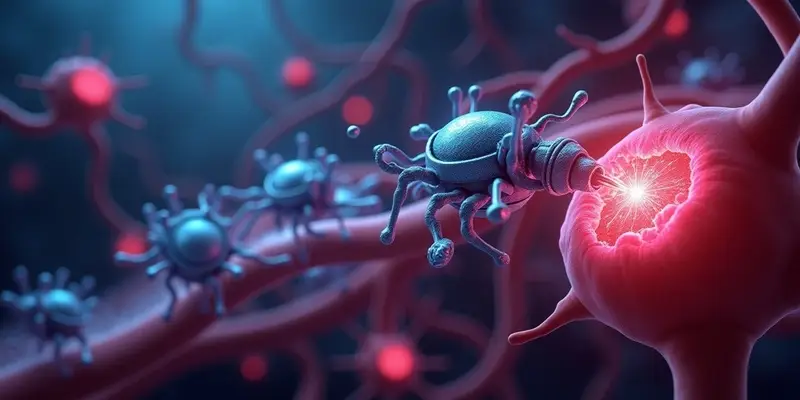- Published on: Feb 14, 2023
- 2 minute read
- By: Secondmedic Expert
Adenocarcinoma Cancers: Symptoms, Causes, Diagnosis
Adenocarcinoma Cancers: Symptoms, Causes, Diagnosis
Adenocarcinoma is a type of cancer that begins in the cells that make up glandular tissue, such as the lining of the lungs, the breast, or the colon. This type of cancer is often aggressive and can spread to other parts of the body, making it a serious health concern. In this blog, we will discuss the symptoms, causes, and diagnosis of adenocarcinoma cancers.
Symptoms of Adenocarcinoma Cancers
The symptoms of adenocarcinoma cancers can vary depending on the location of the tumor. Some common symptoms of adenocarcinoma of the lung include coughing, chest pain, and shortness of breath. Symptoms of adenocarcinoma of the breast can include a lump or thickening in the breast tissue, changes in the skin or nipple, and discharge from the nipple. Symptoms of adenocarcinoma of the colon can include abdominal pain, changes in bowel habits, and blood in the stool.
Causes of Adenocarcinoma Cancers
The exact cause of adenocarcinoma cancers is not yet known, but there are several risk factors that have been identified, including age, family history, smoking, and exposure to certain chemicals. People with a personal or family history of cancer are also at increased risk for developing adenocarcinoma cancers. Other risk factors for adenocarcinoma of the lung include exposure to radon and air pollution, while a diet high in fat and low in fiber is a risk factor for adenocarcinoma of the colon.
Diagnosis of Adenocarcinoma Cancers
Diagnosing adenocarcinoma cancers typically involves a combination of tests, including imaging tests such as a CT scan or MRI, biopsy, and blood tests. A biopsy is the most reliable way to diagnose adenocarcinoma cancers, and involves removing a small sample of tissue from the affected area for examination under a microscope.
In conclusion, adenocarcinoma cancers can cause serious health problems and it is important to be aware of the symptoms, causes, and diagnosis of this type of cancer. If you are experiencing any symptoms of adenocarcinoma cancers, it is important to see a doctor right away for a proper diagnosis and treatment plan.
At Secondmedic, we are dedicated to providing the latest information and resources to help you understand and manage your health. Contact us today to learn more about adenocarcinoma cancers and other health conditions, or to schedule an appointment with one of our experts.
Once a diagnosis of adenocarcinoma cancers has been made, the next step is to determine the best course of treatment. The specific treatment plan will depend on several factors, including the type and stage of the cancer, as well as the patient's overall health and personal preferences.
Some common treatment options for adenocarcinoma cancers include surgery, radiation therapy, and chemotherapy. Surgery is often the first line of treatment for adenocarcinoma cancers and involves removing the affected tissue, or in some cases, the entire organ. Radiation therapy uses high-energy radiation to kill cancer cells and shrink tumors, while chemotherapy uses drugs to target and destroy cancer cells.
In some cases, a combination of treatments may be recommended, such as surgery followed by radiation therapy or chemotherapy. In addition, new and innovative treatments, such as immunotherapy and targeted therapy, are also being used with increasing frequency to treat adenocarcinoma cancers.
Prevention and Early Detection of Adenocarcinoma Cancers
Preventing adenocarcinoma cancers can be difficult, as the exact cause of the disease is not yet known. However, there are steps you can take to reduce your risk, such as avoiding tobacco and excessive alcohol consumption, maintaining a healthy diet, and getting regular exercise.
Early detection of adenocarcinoma cancers is key to successful treatment, and regular cancer screenings can help detect the disease at an early stage. Some common screening tests for adenocarcinoma cancers include mammograms for breast cancer, colonoscopies for colon cancer, and low-dose CT scans for lung cancer.
Living with Adenocarcinoma Cancers
Living with adenocarcinoma cancers can be a challenging experience, but with the right support and resources, it is possible to maintain a good quality of life. In addition to following your treatment plan, it is important to take care of your mental and emotional health, and to seek support from family, friends, and healthcare professionals.
At Secondmedic, we offer a wide range of resources and support services to help you and your loved ones navigate the journey of living with adenocarcinoma cancers. Our team of experts can provide information, guidance, and support every step of the way.
In conclusion, adenocarcinoma cancers can have a profound impact on your life, but with the right resources and support, it is possible to manage this condition and live a full and active life. If you or a loved one has been diagnosed with adenocarcinoma cancers, we encourage you to reach out to Secondmedic for information, support, and care.










